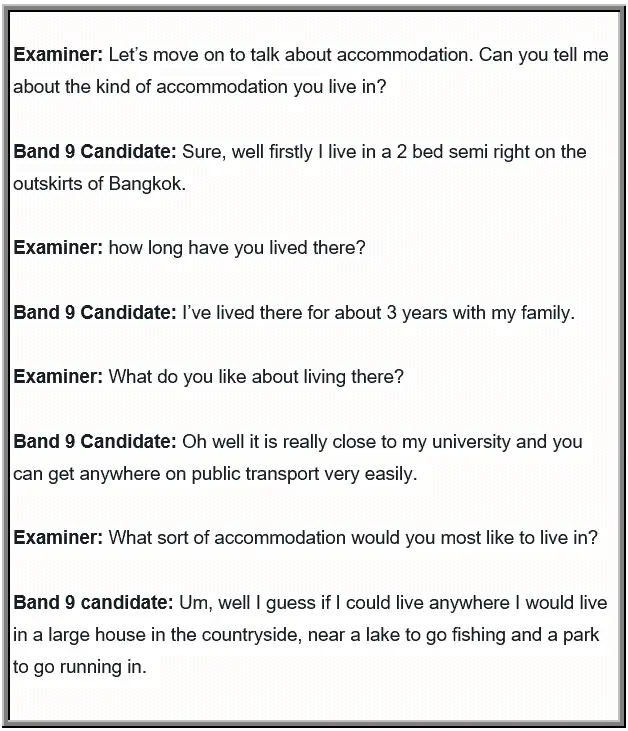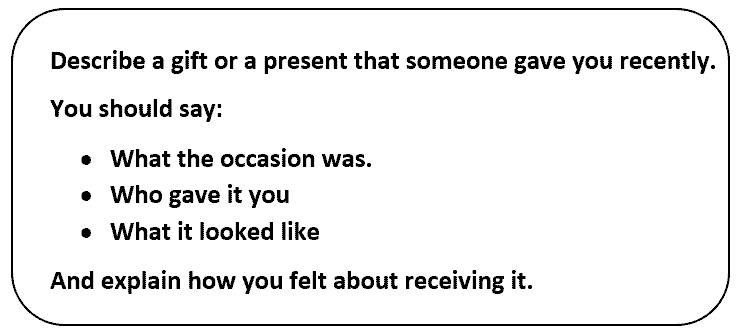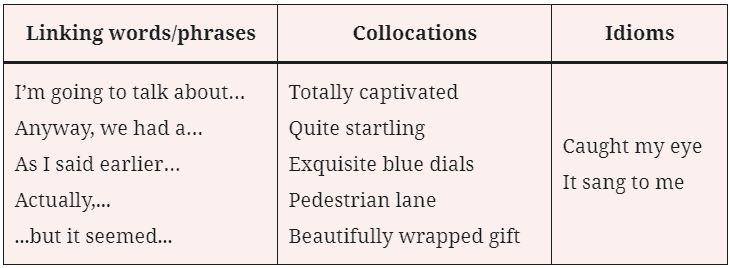Firstly, to be clear I am a former IELTS Speaking examiner and so the information I am offering is genuine and the advice I give will work.
This article, is aimed at students who are already very good at English and are just looking for that extra nudge to get them from an IELTS band 8 to a band 9 in speaking.
Sure, these tips may help a band 7 candidate edge up to a band 8 but this article is mainly aimed at showing band 8 candidates how to get a band 9 in IELTS speaking.
You Can Usually Only Get An IELTS Band 9 In Speaking If…
1. You are a native speaker and for some reason, you have to prove your level of English. This can sometimes happen for visa/immigration purposes.
2. You have lived in an English speaking country for a number of years and interacted in English for most of that time, i.e. you did not just hang around in a group with other people of the same nationality, you actually integrated into society. This might have been through high school or university.
3. You have worked extensively with native English speakers for a prolonged period of time.
Without having lived in an English speaking country, or having worked extensively with native speakers, achieving an IELTS band 9 in speaking is like trying to sail a ship without wind!
Author: An Unknown pessimist
Sometimes people who have studied really hard in their own country and really applied themselves to learning English, can do very well in the test, but to get a band 9 in speaking without having extensive and prolonged exposure to the English language is extremely difficult.

Why Is It Difficult To Get A Band 9 In IELTS Speaking?
Because, essentially you need to think in English and understand and be able to use all the nuances of the language to express yourself of which there are so many.
English has such a great scope of vocabulary that it is nearly impossible to get a full and complete grasp of it from textbooks and study from your own country alone. So, with that in mind, here is how a band 9 IELTS speaking candidate will perform in the test.
Inside The Examiner’s Head
I am going to talk you through this from an examiner’s point of view so you know exactly what we IELTS examiners are looking for right from the moment the candidate first walks in the room. Here we go…
What usually happens is that the examiner will either go to collect the student from a waiting room, or the examiner will be waiting in the doorway of the test room and an assistant will bring the candidate in.
Note, at this point the examiner is already recording anything you or they say, this is simply for security reasons and to protect the integrity of the process.

Now, if you are walking into an interview and all that matters is that you speak in your own language, naturally and freely. How confident would you feel?
You would feel very confident, in fact, you would probably feel that the test is a bit unnecessary for you and enter the room without hesitation, or worry. The examiner sees this immediately in your body language and actions.
If the candidate is hesitant and looks nervous, immediately an examiner might subconsciously be thinking that the candidate is not a fluent speaker because this is clearly a situation they are not completely comfortable in.
Next, the examiner is going to give a short monologue where they speak aloud giving the examining details of the test, the candidate name and number, the centre name and number and the examiner’s name and number. The examiner will then ask for the candidates passport.
At this time the examiner will get an immediate first impression of your language. A band 9 candidate when asked for their passport will probably respond immediately with a phrase such as, ‘of course’, ‘sure’, or simply a ‘yes’ and a smile, then hand over the passport.
There is no need to say anymore than this at this point, to do so would be unnatural and would not mirror the response of what a native speaker would do.
How To Get A Band 9 In IELTS Speaking Part 1
The examiner will ask basic everyday questions to which a band 9 candidate will respond naturally and freely.
They won’t try to give a great long speech about themselves after simply being asked where they are from. They will probably just give a normal simple response to a simple question. For example, here is how the conversation may flow in part one of the test:

So, what is so special about that answer that makes it an IELTS band 9?
Well, one of the first things an examiner will hear is whether you are sound linking or not. Sound linking is when words are said together almost as one word. So, rather than there being a slight pause between words some groups of words will run together.
This is occurs naturally when the last sound of one word is a consonant and the starting sound of the next word is a vowel. In the conversation above, an IELTS speaking band 9 candidate would link the following words together, i.e. there would be no gap in sound between the two words, the first word would flow straight into the second.
FirstlyI
Liveina
Righton
Theoutskirtsof
Those examples are just in the first sentence alone! You can guarantee the examiner will notice pretty much straight away if you are ‘sound linking correctly or not.
If a candidate does not link sounds then they won’t sound like a native speaker and no matter how good their vocabulary or grammar is, they will never score an IELTS speaking band 9 for fluency.
Choose Your Words Carefully For A Band 9
The other thing the examiner will notice is their language choice. The words ‘outskirts’ and ‘2 bed semi’ are very precise words that fit the situation perfectly.
The candidate has made word choices like a native speaker. ‘2 bed semi’ refers to a 2 bed semi-detached house but is commonly abbreviated in this way and the word outskirts is far more natural sounding than a phrase such as ‘on the edge of the city’.
Finally, in this conversation the examiner will also note that in the last question the candidate responded immediately with a perfectly structured second conditional ‘if’ statement.
Importantly, the candidate was not deliberately trying to insert the higher level grammar into the conversation to get a higher band, they simply responded using the appropriate grammar structure at the appropriate time.
It should also be noted that the candidate has used native like expressions/fillers such as ‘Um well’ and ‘Oh well’, these are perfectly normal responses to buy a candidate ‘thinking time’ just as native speakers commonly do.
So far so good for this candidate, but remember the examiner will allocate your band score based on the entirety of the test, not just on one or two parts, but your performance over the whole of the test.
Part 1 – IELTS Speaking Band 9 Tips Summary:
- Link the sounds of words together where possible.
- Make appropriate word choices.
- Use natural fillers where necessary.
- Use appropriate grammar, don’t try to show off.
Read my full guide to IELTS speaking part 1 here.
How To Get A Band 9 In IELTS Speaking Part 2
In part 2 the examiner will hand over a cue card to the candidate with 3 bullet points on it. They will then be given one minute to prepare to speak about those topics. Here is an example cue card which is also used in the video further down the page.

I have noticed that band 9 candidates only make notes about the ideas they will talk about, they will not make notes about grammar or vocabulary to use as they don’t need help with that, it already comes naturally to them.
Furthermore, what the question prompts are about is of no real significance to them as they have the required range of vocabulary to talk about anything at all.
One of the most prominent features of a band 9 speaking candidate in this part of the test is the variety of linking words and phrases they will use.
Listen to this candidate and see if you can hear the linking words and phrases she uses in part 2 of the test.
Here are some of those linking words/phrases and a few other noticeable language points:

Also note the use of pauses for dramatic effect and emphasis, this shows great command of the language. The speaker is not pausing to think about what vocabulary or grammar to use, she is pausing to build to the climax of what she is saying and make the listener remain attentive.
It is very easy for an examiner to tell if a candidate is pausing to think of language or for dramatic effect as in the case here. If they pause to think about language this will count against there fluency and coherence band score.
Part 2 IELTS Speaking Band 9 Tips Summary:
- Use a range of linking words and phrases naturally incorporating sound linking.
- Demonstrate high level collocation, match words together that go together (totally captivated).
- Where appropriate idioms will naturally appear (out of the blue).
- Control the pace and pause of your speaking effectively.
Read my full guide to IELTS speaking part 2 here.
How To Get A Band 9 In IELTS Speaking Part 3
In this part of the test the examiner will try to instigate a more open discussion with you on topics related to the previous part of the test.
It will last 4-5 minutes and is supposed to cover more abstract ideas and issues. The reason being that these issues are more difficult to discuss and can therefore really stretch a candidate’s ability.
This part is when examiners really find out if you are a band 9 or not as you will have to engage naturally and appropriately throughout with the examiner.
The IELTS examiner will also have some flexibility with their choice of questions and will ask questions which will require more advanced language to candidates that they feel could get a band 9. The candidate will not be aware of this subtle choice of questions that the examiner is making.
Now, have a listen to part 3 of this interview before we examine it further to see what makes it a band 9 for speaking. The video will play from the start of part 3 of the test automatically.
The opening question was: ‘Can you tell me how people feel when they receive a homemade gift and when they received a shop bought gift?’
The candidate replies:
‘I think as with everything, it depends on the person and the gift. When a grandchild makes something for their grandparents…
In part 3 there is a real focus on talking about the general public and their thoughts, opinions and desires which makes it more tricky than simply saying what you think, or your friend thinks. Moving from ‘I’, ‘we’ and ‘you’, in part 1 and 2, to, ‘person’, grandchild, and ‘people’ in part 3. This is a distinct feature of part 3 which needs to be mastered before there is any chance of getting a band 9.
Notice how the examiner usually asks a follow up question after the main question they have asked. It is important here that a band 9 candidate responds spontaneously as a native speaker would. This lady does that particularly well.
The candidate also uses word stress particularly well to emphasise important words. Notice how she stresses the word ‘both’ to draw attention to this word and her thoughts.
‘I think most people get pleasure out of both, of course it depends.’
Interestingly, the ideas she gives are not particularly imaginative, creative, or original but she does explain and describe those ideas very well. She uses phrases such as ‘fill our hearts with joy’, ‘bought in haste’ and she speaks in a natural mix of simple, compound and complex sentences as appropriate.

Here is a complex sentence example:
‘We may not get a lot of pleasure out of giving gifts to children who we know may not appreciate them but if we have found the perfect gift for someone we love and we know it is going to make them happy, well, then, this is really going to fill our hearts with joy.’
You might also notice that most of the time in part 3 she is using present simple tense, so this proves that you do not need to use lots of different tenses to impress the examiner, just use the tenses that are appropriate.
Of course, all of the common mistakes that second language learners make with articles (a, and and the) being missing, or being used incorrectly and the misuse or overuse of prepositions are not made.
Finally, this speaker has got the tone, that is the level of her formality just right. This is very difficult to do for a non-native speaker. She sounds both polite, friendly and neither too formal or informal.
She has done this by making certain word choices. For example, she says ‘the perfect gift for someone we love’ rather than ‘a suitable present for our spouse’.
Whilst these have very similar meanings the tone and feeling these give out is slightly different and the former sentence gets the tone of the interview just right, whereas the latter sounds a touch too formal although still grammatically correct.
Part 3 – IELTS Speaking Band 9 Tips Summary:
- Talk about the public opinions in the third person.
- Respond promptly and fully to follow up questions.
- Be precise with all elements of grammar.
- Use the appropriate tense, don’t force it.
- A mixture of simple, compound and complex sentences should occur naturally.
- Make good word choices to create the appropriate tone of response.
Read my full guide to IELTS speaking part 3 here.
Reaching Band 9 Fluency Levels
Getting a band 9 in IELTS speaking means reaching the top level of this IELTS band marking criteria which all IELTS examiners are constantly thinking about as you speak during the test.
Reaching this level of fluency is usually achieved by living in an English speaking country or through working closely with native English speakers for a prolonged period of time.
However, as well as using the fluency exercises in IELTS books and taking a mock online IELTS test, here are a few simple ideas to help you build up your fluency levels.
Practice 1
Read out a short passage from a book or magazine and record yourself. Play it back and try to write down everything you just recorded. How easy was it to listen to yourself?
Were there any words or sounds that were difficult to understand. Even better get a friend to write down what you were saying and see how well they could understand you. This can quickly identify areas of pronunciation that you need to get under better control.
Practice 2
Choose a video from TED that you enjoy. Open the transcript and read along with the speaker for 30 seconds and part of the video. Try reading the same part again only this time gradually turn the sound down and back up again (or get a friend to do it) and see if you are still reading at the same pace/rhythm and with the same intonation patterns.
Repeat this a few times until you can easily stick to the same rhythm as the speaker.
Practice 3
Get real feedback from IELTS examiners. There are services out there such as this one which will allow you to do all parts of the speaking test (and the reading, writing and listening) and then give you a complete breakdown of what you are doing well and what you need to improve on. You can then focus on those elements only, a really effective method of practicing for the IELTS test.
Final Words of Warning…
And finally, remember, the purpose of any language is to communicate effectively. Don’t let yourself get frustrated or demotivated because you can’t quite get the band score you want or need, IELTS is not a perfect test as this academic paper points out in the conclusion.
Instead, focus on the language learning journey that you are on and try to enjoy the process of learning a language, such as, by making new friends, understanding new television series, understanding British/US humour, or through seeing the hidden meaning in pop songs, poems or news articles.
Immerse yourself in the language and don’t worry about how to get band 9 in IELTS speaking, if you get there then great, but if you don’t, relax – the world won’t stop spinning!
If you have managed to read this lengthy article then I’m pretty sure that you are more than capable of communicating effectively in English already, so well done to you!
Recommended IELTS Study Tools
Thank you for reading this article. I always get lots of questions about how else to get a better band score quickly. So, this is what I recommend:
Complete IELTS Course: Of course, my full course ‘INCREASE YOUR IELTS‘ covers everything you need to need to know to pass IELTS, including practice questions, model answers, grammar work, strategies for every possible reading, writing and listening question type, as well as a complete speaking course too, check it out here.
IELTS Essay and Speaking Feedback: To complete full mock tests and get feedback from IELTS examiners on your IELTS essays or speaking tasks then visit: IELTS Feedback and Mock Tests, here.
Improve your grammar fast by using the Grammarly suggestions to improve your writing. Every IELTS students should have this free grammar improving tool.
Improve all-round English skill with EnglishClass101.com. If you have failed IELTS more than once then you probably need to improve your general level of English. Use the free online lessons and vocabulary building tools here and start improving today! HIGHLY RECOMMENDED!





